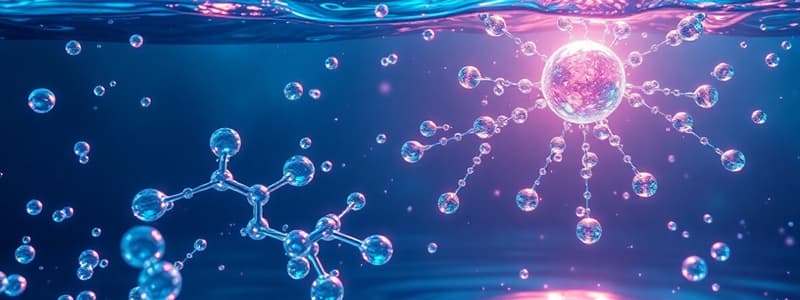Podcast
Questions and Answers
What role does water play in maintaining constant biochemical reaction rates in organisms?
What role does water play in maintaining constant biochemical reaction rates in organisms?
- It allows faster movement of enzymes.
- Water decreases the solubility of metabolic waste.
- It provides a high concentration of nutrients.
- Water regulates temperature due to its high specific heat capacity. (correct)
Why does ice float on liquid water?
Why does ice float on liquid water?
- Ice is lighter than water at all temperatures.
- Ice is warmer than liquid water.
- Ice has a lower density than liquid water. (correct)
- Ice is a solid form of water without any specific properties.
What characteristic of water is primarily responsible for high surface tension?
What characteristic of water is primarily responsible for high surface tension?
- The weight of water molecules.
- The presence of pollutants in the water.
- Hydrogen bonds between the water molecules. (correct)
- The temperature of the water.
How does water's unique property of high specific heat capacity benefit aquatic life?
How does water's unique property of high specific heat capacity benefit aquatic life?
What is the significance of water being a polar molecule in biological systems?
What is the significance of water being a polar molecule in biological systems?
Which property of water contributes to its role as a solvent in biological systems?
Which property of water contributes to its role as a solvent in biological systems?
What effect does the insulation from ice have on aquatic organisms?
What effect does the insulation from ice have on aquatic organisms?
How does water facilitate the transport of nutrients and gases in living organisms?
How does water facilitate the transport of nutrients and gases in living organisms?
What effect does water's high melting and boiling points have on environmental temperatures?
What effect does water's high melting and boiling points have on environmental temperatures?
What is the primary reason for water's ability to support life in aquatic ecosystems?
What is the primary reason for water's ability to support life in aquatic ecosystems?
What causes the polarity of water molecules?
What causes the polarity of water molecules?
How do hydrogen bonds affect the physical properties of water?
How do hydrogen bonds affect the physical properties of water?
What role does water play in transport within living organisms?
What role does water play in transport within living organisms?
What is a consequence of water's high specific heat capacity?
What is a consequence of water's high specific heat capacity?
Why do polar molecules dissolve in water?
Why do polar molecules dissolve in water?
Which property of water is responsible for its high surface tension?
Which property of water is responsible for its high surface tension?
What is an example of water's importance in metabolic reactions?
What is an example of water's importance in metabolic reactions?
What happens to ions when dissolved in water?
What happens to ions when dissolved in water?
Why does water have high melting and boiling points?
Why does water have high melting and boiling points?
What primarily causes water to be an excellent solvent for ions?
What primarily causes water to be an excellent solvent for ions?
Flashcards are hidden until you start studying
Study Notes
Water's Molecular Structure and Properties
- Water molecules are dipolar, with oxygen (Ƨ -) carrying a slight negative charge and hydrogen (Ƨ +) carrying a slight positive charge.
- This molecular polarity leads to hydrogen bonding, allowing water molecules to attract one another.
Role as a Solvent
- Water's dipolar nature enables it to dissolve ions and polar molecules.
- Positive hydrogen ions attract negatively charged ions (anions), while negative oxygen attracts positively charged ions (cations).
- Examples of substances transported in water include oxygen, carbon dioxide, amino acids, and glucose.
Physical Properties of Water
- High melting and boiling points due to the strength of hydrogen bonds that must be overcome for phase changes.
- Exhibits high surface tension as cohesive forces (hydrogen bonds) outstrip adhesive forces between water and air, creating a thin skin on the surface.
Importance in Biological Systems
- Essential for metabolic reactions by dissolving reactants and facilitating their movement for interaction.
- Maintains cell membrane stability.
- Acts as a transport medium in living organisms:
- In animals, solubilizes and transports digested food, hormones, antibodies, and waste via blood and lymphatic systems.
- In plants, transports salts via xylem and sucrose/amino acids through phloem.
Specific Heat Capacity
- Water has a high specific heat capacity, requiring 4200 joules to raise the temperature of 1 kg by 1°C.
- Provides thermal stability for ecosystems, allowing slow temperature changes in aquatic environments, benefiting aquatic life.
Density and Freezing Point
- Ice floats on liquid water, insulating the water below and enhancing survival chances for aquatic organisms in cold conditions.
Cohesion and Adhesion
- Cohesion: Water molecules stick together via hydrogen bonds.
- Adhesion: Water molecules interact with different substances, influencing surface behavior.
- Surface tension results from cohesive forces minimizing surface area, creating resistance to external forces.
Benefits to Aquatic Life
- Transparent water allows light penetration, crucial for photosynthesis in underwater plants.
- Low density of ice maintains a protective layer, preventing complete freezing of underlying water.
- High specific heat capacity ensures stable temperatures, affecting enzyme activity and overall ecosystem health.
Studying That Suits You
Use AI to generate personalized quizzes and flashcards to suit your learning preferences.



